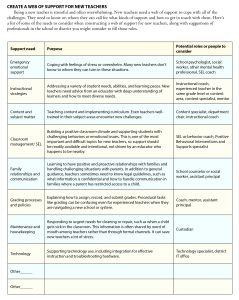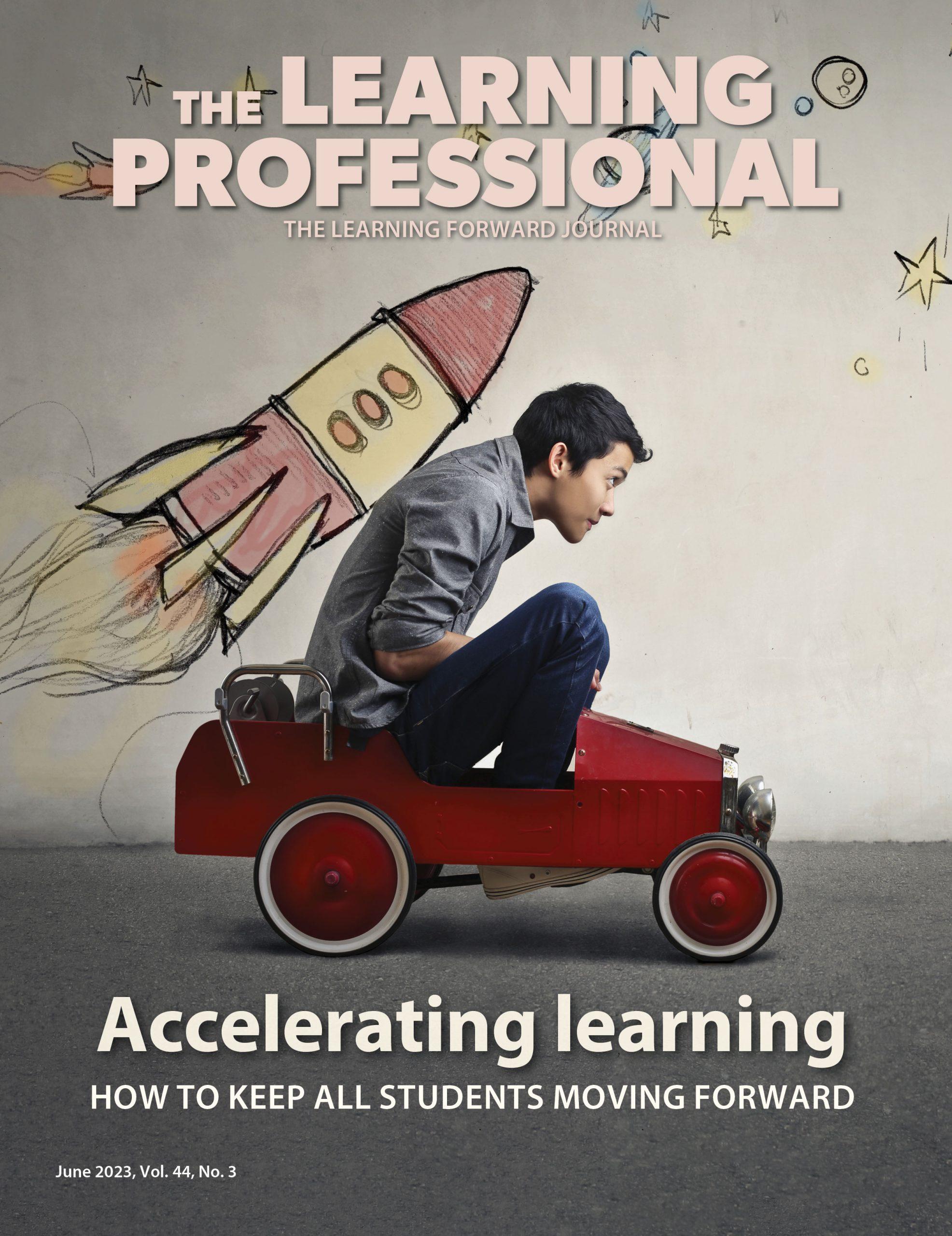FOCUS
To make a difference for every student, give every new teacher a mentor
By Sharron Helmke
Categories: Implementation, Instructional materials/curriculum, Learning designs, Mentoring & induction, School leadership, System leadershipAugust 2022
I still cringe when I remember my first year as a special education teacher at a suburban high school. I met my assigned mentor during the whirlwind week of meetings leading up to the start of school and learned that she was also mentoring two other teachers in addition to having a full teaching schedule of her own. In those early weeks, her time was stretched thin, and I was lucky to get a five-minute conversation with her during hall breaks. As fall wore on, I saw even less of her, and by Halloween, my mentoring was effectively over.
On my own, without guidance, I struggled just to get through each day. That was not a recipe for successful instruction, and it left no opportunity to learn by reflecting on my occasional successes. The year was less a learning experience than a sheer test of perseverance.
I wish I could say my story is unique, but over years of facilitating Learning Forward’s Mentor Academy, I’ve heard countless stories that are similar to mine. Even stories of more involved and interactive mentoring rarely include the kind of collaborative partnerships that Standards for Professional Learning describe as integral to continuous improvement (Learning Forward, 2022).
Learning Forward is committed to changing that pattern by working with states, districts, and schools to develop strong, instructionally focused mentoring initiatives that result in better teaching and learning for everyone involved. Through our customized Mentor Academy, we help systems shift away from traditional “buddy” type mentoring to a program designed to foster instructional growth from the first weeks of school. With teacher growth as the expectation from Day One, everything improves, from training and support for mentors to the learning culture of the school to the outcomes for new teachers and their students.
Why mentoring matters
Mentoring is often the first form of professional learning a teacher receives. Because it is formative to the educators new teachers will become, I encourage state and local education agencies to think carefully about its design and implementation. I also encourage mentors to understand the scope of their impact.
''Mentoring is often the first form of professional learning a teacher receives.'' @SharronHelmke #TheLearningPro Click To TweetWhen I lead a Learning Forward Mentor Academy session, I stress to the mentors that they aren’t just helping new teachers get through their first year. They are building habits that will stay with those teachers throughout their educational careers, and through that, they are impacting every student those teachers will ever serve. I remind them: “You are developing the colleagues you want to learn and teach beside.”
I also point out that mentoring should introduce and welcome new teachers into a culture that values a holistic and ongoing approach to professional learning. Mentoring can and should be an entry point to a system of relevant, high-quality learning and professional growth. Ultimately, a mentorship based on a collegial, growth-focused partnership gives rise to a cadre of educators who expect their colleagues to be supportive, collaborative, inspiring, and continually seeking to improve their own practice. Over several years and cadre after cadre of such like-minded folks, this eventually becomes the institutionalized culture of the campus and district. Collaborative growth becomes the expectation of administration, teachers, and the institution itself (Muhammad, 2009).
''Mentoring can and should be an entry point to a system of relevant, high-quality learning and professional growth.'' @SharronHelmke #TheLearningPro Click To TweetThe participants in the academies I lead respond to the call to shape their profession, and they rise to the challenge. Over the first few sessions of the academy, they begin to see themselves as modeling the spirit and practices of collaborative inquiry and the dedication to lifelong learning necessary to become a highly effective teacher of all students. They learn to build supportive relationships with colleagues based on trust, respect, and recognition of strengths. They deepen their own practice, too. I often hear surprise in the voices of even experienced mentors as they talk about how mentoring is leading to changes and growth in their own classroom teaching.
Learning Forward’s approach
Beginning in 2016, Learning Forward designed a mentor training program for Louisiana Believes, a statewide education reform initiative that includes teacher and leader preparation as one of its main pillars. The mentor training program is based on decades of experience designing and facilitating effective professional learning that honors the needs of adult learners in all stages of their career as well as a deep knowledge of the systemic conditions necessary for instructional improvement.
For three years, our team of designers worked closely with the Louisiana Department of Education to craft a program to train and support mentors who work closely with new teachers in their first through third years of teaching. The goal was to foster a deep understanding of the relational and instructional skills a mentor needs to have to accelerate new teachers’ instructional effectiveness (Louisiana Department of Education, n.d.).
Louisiana mentors engaged in extensive professional learning, including group and individual support, from Learning Forward (Manning & Bouffard, 2020). They demonstrated implementation and effectiveness of their newly acquired skills by satisfying the requirements needed to earn a microcredential issued by BloomBoard (Louisiana Department of Education, n.d.), and they put these skills into practice with new teacher mentees in their schools or districts.
As a result of the program, 95% of participating mentors felt prepared and confident to mentor novice teachers and apply for the state mentor teacher designation. In addition, over 90% reported they would be able to apply what they learned in their own classroom teaching (Learning Forward, 2020). The original Learning Forward program and its subsequent 2022 revisions now form the basis of the mentoring programs taught by all Louisiana Believes-approved mentor training providers.
Since completing our work with the Louisiana Department of Education, we at Learning Forward have continued to revise and offer our own Mentor Academy based on the experiences and feedback of the organizations with whom we have partnered. Working in collaboration with states such as New York and Texas and districts such as South Bend (Indiana), Lansing (Michigan), and Jefferson County (Kentucky), we customize our program to help mentors and those who oversee mentoring programs integrate best practices into their existing professional learning and induction programs. We make the learning immediately applicable so that mentors can prepare novice teachers for a seamless transition to full participation in the professional learning culture of the campus and district.
Our Mentor Academy is grounded in an instructionally focused approach to mentoring. This approach is designed to support mentors in coaching novice teachers through their first cycles of continuous improvement based on a reiterative cycle that includes:
- Data-informed goal-setting for both student learning and mentee learning;
- Learning new teaching behaviors through observation, practice, and refinement; and
- Gathering and assessing evidence of impact that is most indicative and proximal to the change expected (Manning, 2018).
Through the school year, this cycle is repeated with a gradual release approach that instills the cycle at the heart of the mentee’s teaching practice while also fostering the skills needed to sustain collaborative relationships with colleagues, first with their mentor and later with their professional learning communities (PLCs), instructional coaches, and peers.
Within this cycle, mentors guide mentees to develop key teaching behaviors that include instructional design that considers the needs and strengths of all learners; attentive and responsive classroom interactions with students; and consistent engagement in reflection, using relevant data to assess the impact of their teaching behavior and adapt practices accordingly (Killion & Harrison, 2017).
Key elements for success
A mentor training program like Learning Forward’s Mentor Academy is a key piece of a larger mentoring and induction system. Such a system requires intentional planning and structures at the district and campus levels. Most importantly, it requires a state-, district-, and campus-level commitment to shift away from traditional mentoring to a program that leads to instructional growth and fits within a comprehensive induction approach.
Next, it requires planning for ongoing professional learning for mentors that provides support throughout the school year and just-in-time learning as they meet the challenges of guiding a novice teacher to instructional improvement. As all educators know, starting a cycle of improvement is the easy part; learning our way to new, sustainable practices that improve student learning is the difficult part. Mentors need support and additional resources when both mentors and mentees begin to feel the stress of sustained effort toward change.
An equally important consideration is identifying relevant criteria for choosing effective mentor teachers. As both a district mentor program coordinator and a Mentor Academy facilitator, I’ve learned that it’s important to seek out those individuals who know how to inspire others through example, whose manner fosters trust and communicates acceptance, and whose commitment to lifelong learning makes them unashamed to admit they don’t yet have all the answers to the teaching puzzle (Killion & Harrison, 2017). Of course, they must be passionately committed to teaching, mentoring, and the success of all students (Oregon Department of Education, n.d.).
These are the individuals who can best create collegial, guiding partnerships with mentees, inspire the trust necessary for adults to admit to not knowing, and are willing to let others find their own teaching style rather than trying to impose their own preferences and teaching style on the mentee. In one of the final sessions with last year’s New York mentors cadre, I asked the mentors what they would look for in colleagues they would encourage to pursue mentoring. Nonjudgmental attitude, patience, and dedication to being there when needed were some of the most common responses.
The work of ensuring that novice teachers develop habits that support teacher and student growth shouldn’t fall solely on the shoulders of mentors, however. Wise leaders build a web of support so novice teachers can always find someone available to talk, listen, or support their learning. Mentors are certainly central to this web, but instructional coaches should be there as well, as should department chairs, team or grade-level leads, evaluators, and even school psychologists.
''Wise leaders build a web of support so novice teachers can always find someone available to talk, listen, or support their learning.'' @SharronHelmke #TheLearningPro Click To TweetIn his description of four types of teachers, educator and author Anthony Muhammad (2009) calls novice teachers “tweeners” — they are as yet undecided about whether to settle comfortably into the status quo or commit to changing their own practice for the benefit of all students. By building a web of available support for mentors, you can increase the odds of the latter happening and ensure that novice teachers will find counsel with someone who supports their growth and fosters a growth mindset.
Making the most of mentoring
Here are actions you can take right now to improve the quality of mentoring.
Secure ongoing, high-quality professional learning for your mentors. This professional learning should foster implementation of growth-focused relationships, adult-learning theory, and frequent, instructionally focused reflection conversations. Even if existing structures and schedules won’t allow every element of an instructionally focused mentoring program to be enacted this year, the improved mentoring relationships and conversational focus will foster a growth mindset in novice teachers they will carry into future PLC work and change initiatives.
Learning Forward’s Mentor Academy has served as the exemplar of this type of mentoring for numerous states and school districts. It fully integrates Standards for Professional Learning and can be customized to tie seamlessly into a district’s existing high-quality professional learning structures.
Make time for collaboration. Once the focus of the program is in place, collaboration time is the most important resource. Ensure that mentors and mentees have designated and protected time to engage in learning-focused activities such as observation with data collection, modeling, and co-teaching, as well as planning and reflection conversations.
Through our work in states across the U.S., we’ve learned that some states, districts, or union guidelines restrict who can observe teachers in action. Research what’s possible within your local guidelines and begin designing schedules that provide time for mentor-mentee collaborative planning and reflection as well as time for whatever reciprocal classroom observations and co-teaching those local guidelines allow.
Develop a web of support map. New teachers need to know to whom they can go for support, on what topics, and how. Too often, they have to learn this information informally or by currying favor with a specific individual. Instead, this information should be widely available and teachers should be encouraged to reach out.
Start by identifying the needs of new teachers and the names of individuals who are willing to make themselves available to support those needs and questions. See the table below for examples of the needs and roles you might consider to fill them. Then use the tool to begin constructing your web of support map. (Download the pdf of this article to view and print larger images of the table and tool.)


By carefully constructing this document and sharing it with all new teachers — including those who have previous experience but are new to your campus — you assure them they have joined a supportive community and are not being thrown into a classroom alone. (You can also see a visual representation of the web of support in this issue’s At a Glance feature.)
From teacher shortages to teacher success
Now is the time to take action to ensure the teachers you are hiring will be the teachers creating strong student outcomes in the future. Schools are grappling with a teacher shortage, a large cadre of new teachers, and a need for more stability in the workforce. These trends can be seen as a problem or as an opportunity to cultivate the next generation of highly effective teachers and leaders and shape a culture of job-embedded, instructional improvement.
With a strong mentoring program, a teacher shortage doesn’t have to mean that teaching effectiveness and student outcomes will drop. It establishes the foundation for new teachers to progress rapidly, improving student outcomes and their own practice at the same time.
''With a strong mentoring program, a teacher shortage doesn’t have to mean that teaching effectiveness & student outcomes will drop. It establishes the foundation for new teachers to progress rapidly...'' Click To TweetPlan now for next year
No matter where you are in your mentoring efforts for the current school year, it is vital to begin now to consider your induction and mentoring structure, processes, and schedules for 2023-24’s cadre of new teachers.
Planning and implementing a strong, instructionally focused mentoring program takes time and collaborative effort. For example, you want to make sure you have time to tackle action items like rewriting (or creating) an appropriate job description and application process for mentor teachers; deciding on content-based vs. general mentoring; gathering data about the number of expected vacancies and the number of mentors needed; and identifying funding sources to cover released time for mentors and mentees to engage in observation, co-planning, and co-teaching.
I recommend starting now with these steps:
- Consider the role of mentoring and mentor training within your larger induction program and professional learning structure. Be intentional about connecting this plan with your school improvement plan.
- Investigate providers of instructionally focused mentor learning and support like Learning Forward. Seek their advice for reframing your existing structures of induction and mentoring.
- Survey current mentees about where the current support system met their needs and where it fell short. Explore the gap they might have experienced between their preservice preparation and the realities of a classroom full of diverse learners.
- Survey current mentors about the challenges they are facing and support or changes they would recommend. Probe for systemic barriers at the district and campus levels.
- Survey administrators and teacher evaluators about the progress they observed (or didn’t observe) in novice teachers and their perceptions of why.
- Develop a plan to collect baseline data on mentors’ and mentees’ practices so you’ll know if the changes you initiate are having the desired impact.
- Advocate for changes in state, union, or district guidelines that create barriers to effective mentoring. Speak from experience and with the needs of students centered. For more information on how to be an effective advocate, visit learningforward.org/advocacy.
Download pdf here.
Learning Forward’s Mentoring Academy
Learning Forward offers its instructionally focused mentoring program in a variety of formats to meet the needs of districts large and small.
We can come to your school or district with a custom-designed mentor training program and mentoring support specifically designed to meet your needs, fit into your existing professional learning structure, and enhance the growth of your novice teachers.
If you are in Louisiana or Texas, we offer state-approved mentor preparation programs that can be facilitated virtually or in your district. Ask us about the options to meet your state’s requirements.
Do you have only a few mentors or want to experience the difference for yourself? Try our open enrollment, virtual mentoring course that brings together mentors from across districts and states.
Read more about the Learning Forward approach to mentoring at services.learningforward.org/services/mentor-teacher-academy.
For more information, contact Sharron Helmke, vice president of professional services, at 800-727-7288 or sharron.helmke@learningforward.org.
References
Killion, J. & Harrison, C. (2017). Taking the lead: New roles for school-based leaders and coaches. Learning Forward.
Learning Forward. (2022). Standards for Professional Learning. Author.
Learning Forward. (2020, December). Mentors matter. The Learning Professional, 41(6), 68. learningforward.org/journal/building-the-pipeline/louisianas-mentor-program-by-the-numbers/
Louisiana Department of Education. (n.d.). Louisiana mentor teachers. www.louisianabelieves.com/teaching/louisiana-mentor-teachers
Manning, T. (2018, June 28). Louisiana is taking the lead in mentoring new teachers. learningforward.org/2018/06/28/louisiana-is-taking-the-lead-in-mentoring-new-teachers/
Manning, T. & Bouffard, S. (2020, December). Mentors make a difference. The Learning Professional, 41(6), 20-23. learningforward.org/journal/building-the-pipeline/mentors-make-a-difference/
Muhammad, A. (2009). Transforming school culture: How to overcome staff division. Solution Tree.
Oregon Department of Education. (n.d.). Characteristics of a quality mentor teacher. www.oregon.gov/ode/schools-and-districts/grants/mentoring/Documents/characteristics_of_a_quality_mentor_teacher.pdf

Sharron Helmke, senior vice president of professional services at Learning Forward, designs and manages the organization’s consulting service programs that support state, regional, and local organizations in translating their improvement and learning goals into custom-designed high-quality professional learning programs that result in scalable and sustainable change. During her twenty-plus years in education she has served in a variety of roles at the campus and district levels, including teacher, instructional coach, and district-based program administrator. She is an international coaching federation certified professional coach, a Gestalt professional coach, and a trauma-informed care provider, all of which inform her approach to supporting educators. She is the author of numerous professional articles, including “To make a difference for every student, give every new teacher a mentor” in the August 2022 issue of The Learning Journal.
Categories: Implementation, Instructional materials/curriculum, Learning designs, Mentoring & induction, School leadership, System leadership
Recent Issues
TAKING THE NEXT STEP
December 2023
Professional learning can open up new roles and challenges and help...
REACHING ALL LEARNERS
October 2023
Both special education and general education teachers need support to help...
THE TIME DILEMMA
August 2023
Prioritizing professional learning time is an investment in educators and...
ACCELERATING LEARNING
June 2023
Acceleration aims to ensure all students overcome learning gaps to do...











